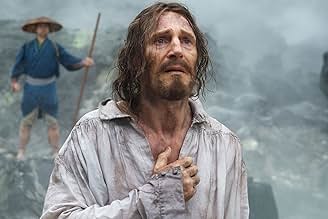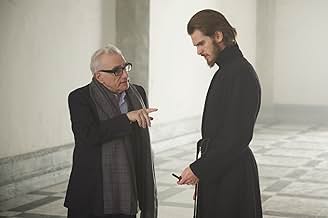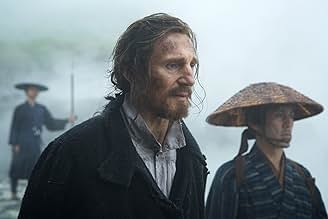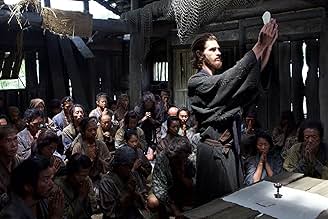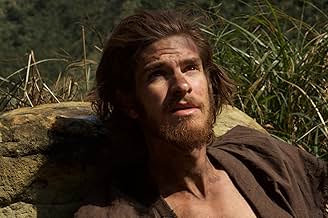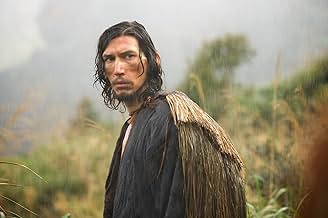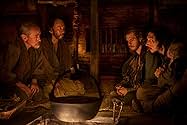En el siglo 17, dos jesuitas portugueses viajan a Japón en busca de su mentor, del que se rumorea es un apóstata, y para propagar el Catolicismo.En el siglo 17, dos jesuitas portugueses viajan a Japón en busca de su mentor, del que se rumorea es un apóstata, y para propagar el Catolicismo.En el siglo 17, dos jesuitas portugueses viajan a Japón en busca de su mentor, del que se rumorea es un apóstata, y para propagar el Catolicismo.
- Dirección
- Guionistas
- Elenco
- Nominado a 1 premio Óscar
- 8 premios ganados y 62 nominaciones en total
Issei Ogata
- Old Samurai
- (as Issey Ogata)
- …
Shin'ya Tsukamoto
- Mokichi
- (as Shinya Tsukamoto)
Yôsuke Kubozuka
- Kichijiro
- (as Yosuke Kubozuka)
Diego Calderón
- Prisoner Augustinian Friar #2
- (as Diego Calderon)
Panta
- Tomogi Villager #1 (Yohei)
- (as PANTA)
- Dirección
- Guionistas
- Todo el elenco y el equipo
- Producción, taquilla y más en IMDbPro
Opiniones destacadas
There's a reasonable argument to say that SILENCE is one of Martin Scorsese's better movies. The talk is that it was a passion project of his for decades, finally being released in all it's artistic endeavors and mysteries. I suppose someone else could argue the opposite: that this is a story full of brutality and despair without the signature style of the aged director. I think I'm falling right on the middle on this one. This is surely one of the year's most powerful stories, and yet I have to admit it left me cold.
The story follows two priests from Portugal (Andrew Garfield and Adam Driver) who venture into hostile Japanese country in search of their mentor, Father Ferreira (Liam Neeson), who has abandoned his Christian faith. Some chalk it up to mere rumors. These two young ministers take the journey to find out for themselves.
What begins as a fairly traditional story ventures into the heart of Japan in the 16th Century with a sharp attention to both detail and horror. This is less a story of a search for one man as it is an odyssey into the despair found in conflicting religious beliefs. Father Rodrigues (Andrew Garfield) holds hope that Ferreira is alive while also working to convert as many locals under cover of darkness. Upon landing on the shores of Japan (smuggled in on small fishing boats from China), he encounters villages of faithful Christians who worship in secret. For them, the arrival of Rodrigues and Father Garupe (Driver) is confirmation of their beliefs. Through language barriers, it seems that God is always present.
As we delve further into the country towards Nagasaki (where Ferreira is said to be held), the two priest break off on separate journeys. Rodrigues, though oftentimes alone, is shadowed by a Japanese recluse named Kichijiro, a drunk who once betrayed his faith in order to spare his life (he witnessed the execution of his entire family) but returns to the faith time again in order to make Confession and amends with the Lord. Rodrigues continues to absolve him, and yet this is the slow unraveling of an aspect of this story: do the Japanese really comprehend the religion in the same way Westerners do?
There are three people who make this movie better than average: Andrew Garfield surely gives one of the year's best performances as a man trapped in his own personal Hell, forced to grapple between martyrdom and eternal damnation. It's a strong year for Garfield, getting accolades and Oscar buzz for his other leading role in 'Hacksaw Ridge.' Trust me, this is the better performance. Second is the skill of Martin Scorsese, who slowly paints a portrait of a time long forgot with such attention to tone. It's a horrifying and at times morbid story to sit through, but there was never a moment I found myself any less than fully-focused and contemplative.
Third is a surprise, a breakthrough performance by a Japanese actor named Issey Ogata who gives without a doubt one of the year's most memorable performances. Throughout the film the Christians living in Japan are routinely inspected by samurai officials who intend to hunt down and capture any found citizens in violation of the law. One such official is Inoue Masashige (Ogata) who treats the job with a certain flair. Constantly waving a fan and with an ear to ear smile, this is a performance that steps above the rest of the cast by perfectly encapsulating the braggadocious nature of Japanese law without missing a beat. It's a winking devil performance that I hope the Oscars won't look over.
'Silence' is at times hard to palpate and yet rewards the audience for it's patience. Whether or not this film can be interpreted as being pro or anti-Catholic is maybe not the ultimate message of this film. While the final act delves into a horrifyingly-dark arena, consider the final shot before the credits begin to role (I won't spoil it). In such a brutal era with antiquated customs, isn't there still hope left to be found?
The story follows two priests from Portugal (Andrew Garfield and Adam Driver) who venture into hostile Japanese country in search of their mentor, Father Ferreira (Liam Neeson), who has abandoned his Christian faith. Some chalk it up to mere rumors. These two young ministers take the journey to find out for themselves.
What begins as a fairly traditional story ventures into the heart of Japan in the 16th Century with a sharp attention to both detail and horror. This is less a story of a search for one man as it is an odyssey into the despair found in conflicting religious beliefs. Father Rodrigues (Andrew Garfield) holds hope that Ferreira is alive while also working to convert as many locals under cover of darkness. Upon landing on the shores of Japan (smuggled in on small fishing boats from China), he encounters villages of faithful Christians who worship in secret. For them, the arrival of Rodrigues and Father Garupe (Driver) is confirmation of their beliefs. Through language barriers, it seems that God is always present.
As we delve further into the country towards Nagasaki (where Ferreira is said to be held), the two priest break off on separate journeys. Rodrigues, though oftentimes alone, is shadowed by a Japanese recluse named Kichijiro, a drunk who once betrayed his faith in order to spare his life (he witnessed the execution of his entire family) but returns to the faith time again in order to make Confession and amends with the Lord. Rodrigues continues to absolve him, and yet this is the slow unraveling of an aspect of this story: do the Japanese really comprehend the religion in the same way Westerners do?
There are three people who make this movie better than average: Andrew Garfield surely gives one of the year's best performances as a man trapped in his own personal Hell, forced to grapple between martyrdom and eternal damnation. It's a strong year for Garfield, getting accolades and Oscar buzz for his other leading role in 'Hacksaw Ridge.' Trust me, this is the better performance. Second is the skill of Martin Scorsese, who slowly paints a portrait of a time long forgot with such attention to tone. It's a horrifying and at times morbid story to sit through, but there was never a moment I found myself any less than fully-focused and contemplative.
Third is a surprise, a breakthrough performance by a Japanese actor named Issey Ogata who gives without a doubt one of the year's most memorable performances. Throughout the film the Christians living in Japan are routinely inspected by samurai officials who intend to hunt down and capture any found citizens in violation of the law. One such official is Inoue Masashige (Ogata) who treats the job with a certain flair. Constantly waving a fan and with an ear to ear smile, this is a performance that steps above the rest of the cast by perfectly encapsulating the braggadocious nature of Japanese law without missing a beat. It's a winking devil performance that I hope the Oscars won't look over.
'Silence' is at times hard to palpate and yet rewards the audience for it's patience. Whether or not this film can be interpreted as being pro or anti-Catholic is maybe not the ultimate message of this film. While the final act delves into a horrifyingly-dark arena, consider the final shot before the credits begin to role (I won't spoil it). In such a brutal era with antiquated customs, isn't there still hope left to be found?
With regards to Martin Scorsese's SILENCE, let me just put it this way, I saw Scorsese's 1988's "The Last Temptation Of Christ," back when I was in college, as you know that film was also an adaptation, and I thought it was pure masterpiece just in terms of its themes because whether or not you'd want to argue that perhaps that some of the approach may have been sacrilegious or religiously inconsiderate, if you will, to me it was about wondering the what if's and whether or not doubt has any footing in order for faith to grow. To a certain extent, SILENCE conveys something similar.
Based on Shusaku Endo's novel, SILENCE is about two Jesuit missionaries who travel to Japan because they have heard that their mentor, Father Ferreira (Liam Neeson) has publicly denounced God. At the time, Christianity was outlawed in Japan, so in their search for their missing mentor, they endure torture, suffering, and the ultimate test of faith.
In a way you could say that SILENCE is Martin Scorsese's way of paying respect to the legendary filmmaker Akira Kurosawa especially for us fans who grew up watching old time Japan's samurai classics, although SILENCE is not action-driven obviously, but the authoritarian rule depicted in this film is definitely something that's culturally based on that particular era.
From technical standpoint, SILENCE is as rich and complex as the story itself, even the violence is done in a graphic yet artistic manner. Because the story is told through Andrew Garfield's Father Rodrigues' perspective, you'll find some of the shots from inside his prison cell, looking out, with the frame being in between the wooden bars, to be quite engrossing. It makes the tension all the more real because your mind just keeps racing, you don't know how much more gruesome it would get. Odd to say this but it sort of becomes a point of anticipation, it's as if every other half-hour or so, you know some Christians are going to get tortured and so you're just bracing for impact. Martin Scorsese's ever-so-reliable high standard quality filmmaking is present through and through, so there's no disappointing you there.
After being religious and full of conviction in "Hacksaw Ridge" as a Seventh-Day Adventist, actor Andrew Garfield becomes religious and full of conviction again, this time in "Silence" and what's interesting is that both films feature Japanese people. All that aside, this is yet another evidence of Garfield's commitment to his work, the same goes for Adam Driver and Liam Neeson who not only went through physical changes, you actually feel a bit concerned for their health, but that conviction is shown in their eyes. It's amazing to see how this former Spider-Man quickly this powerful force. The Japanese actors are equally outstanding, especially Issey Ogata whose performance has his own flamboyant way of being ruthless.
This is Scorsese's long passion project, he had been wanting to do this film for years, but the question remains, and those of you who've watched the film are probably wondering it as well. And my answer is no, I don't think SILENCE means to demonize Buddhism. If this film is Scorsese's way of promoting Christianity, then that is his prerogative. But throughout mankind's history, there had been many cases in many lands where the majority religion, whatever religion that maybe, persecutes the minority religion because they view them as a dangerous threat; a symbol of a potential takeover. Inquisitions have happened everywhere. Which leads me back to what I said earlier about how SILENCE reminds me a lot of "The Last Temptation Of Christ," we see men who are supposed to be like rocks, seemingly falter and start to question their faith, but perhaps questioning your faith is one way of reaffirming it. Liam Neeson's character in this film has a counter argument to Andrew Garfield's Rodrigues and he may make a bit of sense if you see it from his version of truth.
-- Rama's Screen --
Based on Shusaku Endo's novel, SILENCE is about two Jesuit missionaries who travel to Japan because they have heard that their mentor, Father Ferreira (Liam Neeson) has publicly denounced God. At the time, Christianity was outlawed in Japan, so in their search for their missing mentor, they endure torture, suffering, and the ultimate test of faith.
In a way you could say that SILENCE is Martin Scorsese's way of paying respect to the legendary filmmaker Akira Kurosawa especially for us fans who grew up watching old time Japan's samurai classics, although SILENCE is not action-driven obviously, but the authoritarian rule depicted in this film is definitely something that's culturally based on that particular era.
From technical standpoint, SILENCE is as rich and complex as the story itself, even the violence is done in a graphic yet artistic manner. Because the story is told through Andrew Garfield's Father Rodrigues' perspective, you'll find some of the shots from inside his prison cell, looking out, with the frame being in between the wooden bars, to be quite engrossing. It makes the tension all the more real because your mind just keeps racing, you don't know how much more gruesome it would get. Odd to say this but it sort of becomes a point of anticipation, it's as if every other half-hour or so, you know some Christians are going to get tortured and so you're just bracing for impact. Martin Scorsese's ever-so-reliable high standard quality filmmaking is present through and through, so there's no disappointing you there.
After being religious and full of conviction in "Hacksaw Ridge" as a Seventh-Day Adventist, actor Andrew Garfield becomes religious and full of conviction again, this time in "Silence" and what's interesting is that both films feature Japanese people. All that aside, this is yet another evidence of Garfield's commitment to his work, the same goes for Adam Driver and Liam Neeson who not only went through physical changes, you actually feel a bit concerned for their health, but that conviction is shown in their eyes. It's amazing to see how this former Spider-Man quickly this powerful force. The Japanese actors are equally outstanding, especially Issey Ogata whose performance has his own flamboyant way of being ruthless.
This is Scorsese's long passion project, he had been wanting to do this film for years, but the question remains, and those of you who've watched the film are probably wondering it as well. And my answer is no, I don't think SILENCE means to demonize Buddhism. If this film is Scorsese's way of promoting Christianity, then that is his prerogative. But throughout mankind's history, there had been many cases in many lands where the majority religion, whatever religion that maybe, persecutes the minority religion because they view them as a dangerous threat; a symbol of a potential takeover. Inquisitions have happened everywhere. Which leads me back to what I said earlier about how SILENCE reminds me a lot of "The Last Temptation Of Christ," we see men who are supposed to be like rocks, seemingly falter and start to question their faith, but perhaps questioning your faith is one way of reaffirming it. Liam Neeson's character in this film has a counter argument to Andrew Garfield's Rodrigues and he may make a bit of sense if you see it from his version of truth.
-- Rama's Screen --
This was Martin Scorsese's passion project. The reason he waited so long was because he didn't feel like he was ready. But when he finally made it, it bombed. Silence is a deconstruction and an examination of faith and spirituality. It's long, patient, quiet, slow. Thus, by the end of the film you will be exhausted. Andrew Garfield gives one his best performances, watching his soul gradually crumble was nothing short of heartbreaking. Adam Driver and Liam Neeson were great as well. Silence is a film not to be played as background noise. It's very hard to watch at points. But if your patient and committed to view it in it's entirety, you'll find something immensely rewarding. Silence is Scorsese's most underrated film, as well as one of the most underrated films of the 21st century.
In the Seventeenth Century, in Portugal, the Portuguese Jesuit priests Sebastião Rodrigues (Andrew Garfield) and Francisco Garupe[ (Adam Driver) ask permission to Father Alessandro Valignano (Ciarán Hinds) to travel to Japan to investigate the rumors that their mentor Father Cristóvão Ferreira (Liam Neeson) had committed apostasy abandoning his Catholic faith after being tortured by the shogunate. They meet the alcoholic fisherman Kichijiro (Yosuke Kubozuka) that agrees to guide them to Japan. When they arrive at a small village, they learn that the Christians residents live hidden in caves since the Inquisitor kills any villager suspect to be Christian. Along the days, Rodrigues and Garupel propagate Catholicism among the villagers and try to find a lead to Ferreira. But when the Inquisitor arrives in the village with his men, the live of the residents and the priests will change.
"Silence" is a film directed by Martin Scorcese that shows how cruel a man can be. Based on historical facts, "Silence" show the powerful Shogunate defending their religion and culture against the European Catholicism that promises easy paradise to the suffered Japanese workers that has to work lot to pay the taxes and survive. The result is a good, but too long and tiresome film. My vote is seven.
Title (Brazil): "Silêncio" ("Silence")
"Silence" is a film directed by Martin Scorcese that shows how cruel a man can be. Based on historical facts, "Silence" show the powerful Shogunate defending their religion and culture against the European Catholicism that promises easy paradise to the suffered Japanese workers that has to work lot to pay the taxes and survive. The result is a good, but too long and tiresome film. My vote is seven.
Title (Brazil): "Silêncio" ("Silence")
'Silence' is exactly what you would expect from a Martin Scorsese film in that it is well-produced, written and shot with a strong storyline and engaging lead characters. There aren't many films that explore religion and faith as deeply as this one and there's no doubt that it is an intellectual, thought-provoking piece that Scorsese has created. It's also visually stunning - as a piece of filmmaking 'Silence' is difficult to fault.
It is, however, very easy to fault as a piece of entertainment. For all its technical merit, the truth is that this is an overly long, tediously slow and largely dull film that the average viewer will struggle to sit through. The pacing does it no favours and the near three-hour running length is excessive to say the least. It could have been condensed to closer to the two-hour mark without losing much at all from the storyline.
'Silence' is obviously more likely to appeal to those with religious/spiritual beliefs, and they would probably get a lot more out of this film than I did. A well-crafted film, but rather dull and unrewarding for the average viewer.
It is, however, very easy to fault as a piece of entertainment. For all its technical merit, the truth is that this is an overly long, tediously slow and largely dull film that the average viewer will struggle to sit through. The pacing does it no favours and the near three-hour running length is excessive to say the least. It could have been condensed to closer to the two-hour mark without losing much at all from the storyline.
'Silence' is obviously more likely to appeal to those with religious/spiritual beliefs, and they would probably get a lot more out of this film than I did. A well-crafted film, but rather dull and unrewarding for the average viewer.
What Scorsese Film Ranks Highest on IMDb?
What Scorsese Film Ranks Highest on IMDb?
Cinema legend Martin Scorsese has directed some of the most acclaimed films of all time. See how IMDb users rank all of his feature films as director.
¿Sabías que…?
- TriviaAdam Driver lost 50 pounds for the role; 30 before filming, and 20 during filming.
- ErroresIn the scene where Rodrigues and his Translator meet Garupe on the beach, Just after Garupe jumps into the ocean and starts to swim, The Translator is saying dialogue but his lips are not moving for most of the spoken line, and what is spoken does not match his lip movements.
- Créditos curiososThere was no music during the closing credits. The music was replaced by the sounds of the sea, a storm and the sounds of nature. This is in keeping with the deep ties Japan has with nature.
- ConexionesFeatured in Roeper's Reviews: Richard Roeper's Top 16 Films for 2016 (2016)
- Bandas sonorasFrancesco's Cosmic Beam Experience (live, Marina Del Rey)
Composed and performed by Francesco Lupica
Selecciones populares
Inicia sesión para calificar y agrega a la lista de videos para obtener recomendaciones personalizadas
- How long is Silence?Con tecnología de Alexa
Detalles
Taquilla
- Presupuesto
- USD 46,000,000 (estimado)
- Total en EE. UU. y Canadá
- USD 7,100,177
- Fin de semana de estreno en EE. UU. y Canadá
- USD 130,880
- 25 dic 2016
- Total a nivel mundial
- USD 23,834,809
- Tiempo de ejecución2 horas 41 minutos
- Color
- Mezcla de sonido
- Relación de aspecto
- 2.35 : 1
Contribuir a esta página
Sugiere una edición o agrega el contenido que falta

Principales brechas de datos
What is the streaming release date of Silencio (2016) in Canada?
Responda






